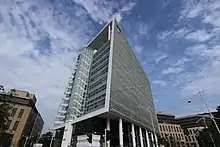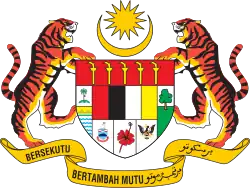Election Commission of Malaysia
The Election Commission of Malaysia (Malay: Suruhanjaya Pilihan Raya Malaysia), abbreviated SPR or EC, is a commission set up for ensuring fair and equitable operations in undertaking the elections in Malaysia. Its establishment is mandated by executive order of the former Prime Minister Mahathir Mohamad. The agency falls under the purview of the Prime Minister's Department.[1]
| Suruhanjaya Pilihan Raya Malaysia (SPR) | |
 Agency logo | |
 | |
| Agency overview | |
|---|---|
| Formed | 4 September 1957 |
| Type | Regulating and conducting elections in Malaysia |
| Jurisdiction | Government of Malaysia |
| Headquarters | 2, Jalan P2T, Presint 2, Pusat Pentadbiran Kerajaan Persekutuan, 62100, Putrajaya |
| Motto | Efficient and Transparent (Cekap dan Telus) |
| Employees | 755 (2017) |
| Annual budget | MYR 71,302,900 (2020) |
| Agency executives |
|
| Parent department | Prime Minister's Department |
| Key document |
|
| Website | www |
| This article is part of a series on the |
| Politics of Malaysia |
|---|
 |
History
The Election Commission (EC) was formed on 4 September 1957, under Article 114 of the Constitution of Malaysia, which empowers it to conduct elections for the Dewan Rakyat and state legislative bodies.
At its establishment, the EC only consisted of a chairman and two members – Datuk Dr Mustafa Albakri Hassan together with Lee Ewe Boon and Ditt Singh.
A secretariat was also set up to fulfil the commission's functions and carry out its decisions, with a secretary made the chief administrator. The first EC secretary was H. Cassidy.
After the formation of Malaysia in 1963 and the inclusion of Sabah and Sarawak, another member was added to represent the two states on a rotation basis. Datuk Abang Marzuki Nor from Sarawak was the first such member appointed.
An amendment to Article 114 made in 1981 provided for the new post of a deputy chairman, and Abdul Rahman Abdul Hassan was the first to hold this position.
Today, the EC has a chairman, a deputy chairman and five members, all appointed by the Yang di-Pertuan Agong after consulting the Conference of Rulers.
Constitutional mandate
Under Article 114, the Commission is empowered to "conduct elections to the House of Representatives (Dewan Rakyat, the lower house of Parliament) and the Legislative Assemblies of the States". Under the Constitution of the independent Federation of Malaya, the Commission comprised one Chairman and two members, but after Malaya merged with North Borneo, Sarawak and Singapore to form Malaysia, the Commission's membership was expanded by constitutional amendment to provide for an additional member from Sabah or Sarawak. A 1981 amendment to the Constitution added another member and created the post of Deputy Chairman.[2]
The Commission has the power to delimit constituencies, revise the electoral roll of registered voters, and regulate the manner in which elections are conducted. Although the Constitution does not refer to the Commission as being a body independent from influence by the government or otherwise, constitutional scholars have generally considered the Constitution as intending to protect the independence of the Commission. Among other things, commissioners are protected by tenure, and may only be removed through the same procedure as a judge of the Supreme Court. The terms of remuneration of a commissioner cannot be altered to his disadvantage after he has been appointed.[2]
Members of the Commission are appointed by the Yang di-Pertuan Agong (King), who must consult with the Conference of Rulers and appoint a Commission which has the confidence of the public. Although the Constitution does not expressly require consultation with the Prime Minister in this regard, it has been argued that under Article 40 of the Constitution, the King cannot act on his own discretion unless explicitly stated; in all other cases, he must acquiesce to the advice of the Prime Minister, and as such the appointments to the Commission are made with the advice of the Prime Minister. Members of the Commission retire at the age of 65.[3]
Functions
Apart from regulating elections, the EC's duties include reviewing the boundaries of parliamentary and state constituencies, holding by-elections and carrying out registration exercises.
It also collects information on newly developed areas to ensure a fair representation of voters in each constituency, promotes awareness on how important it is to vote and revises the electoral roll by deleting the names of those who are dead or have been disqualified.
On polling day, EC members and officers will be stationed at polling centre nationwide to oversee the process.
Controversies
The EC has been accused of being half-hearted in electoral reforms and in 2012, the chairperson and the deputy chairperson was accused to be members of the ruling party. Both individuals admitted to may have been members at some point, but the deputy chairperson later retracted the admission and denounced it as an attempt to besmirch the EC.[4]
During the 14th Malaysia General Election on 9 May 2018, EC was accused of allowing gross gerrymandering and malapportionment practices by the incumbent government. It was also reprimanded as the ballot counting process was the longest in Malaysia's history, with the results still being streamed in after 4 a.m. the following day (10 May 2018, GMT +8:00). EC has also been accused of making the election day on a weekday rather a weekend. It currently denies that it tried to stop overseas Malaysians to vote.
Members of the Election Commission
Current list as of March 2021[5]
| Role | Name | Background |
|---|---|---|
| Chairperson | Abdul Ghani bin Salleh | Civil service |
| Vice chairperson | Azmi Sharom | Academia, law |
| Member | Nik Ali bin Mat Yunus | Civil service |
| Member | Chin Phaik Yoong | Civil service |
| Member | Zoë Randhawa | Bersih NGO |
| Member | Mohd. Faizal Syam bin Abdol Hazis | Academia, international relations |
| Member | Awang Sahari bin E.M. Nadzeer | Royal Malaysian Police |
List of chairmen of the Election Commission
| No. | Chairmen | Term of office | ||
|---|---|---|---|---|
| Took office | Left office | Time in office | ||
| 1 | Mustapha Albakri Hassan | 4 September 1957 | 15 October 1967 | 10 years, 41 days |
| 2 | Ahmad Perang | 16 October 1967 | 9 August 1977 | 9 years, 297 days |
| 3 | Abdul Kadir Talib | 10 August 1977 | 11 October 1990 | 13 years, 62 days |
| 4 | Harun Din | 12 October 1990 | 20 June 1999 | 8 years, 251 days |
| 5 | Omar Mohd Hashim | 21 June 1999 | 11 November 2000 | 1 year, 143 days |
| 6 | Abdul Rashid Abdul Rahman | 12 November 2000 | 30 December 2008 | 8 years, 48 days |
| 7 | Abdul Aziz Mohd Yusof | 31 December 2008 | 24 January 2016 | 7 years, 24 days |
| 8 | Mohamad Hashim Abdullah | 24 January 2016 | 30 June 2018 | 2 years, 157 days |
| 9 | Azhar Azizan Harun | 21 September 2018 | 29 June 2020 | 1 year, 282 days |
| 10 | Abdul Ghani Salleh | 21 August 2020 | Incumbent | 3 years, 65 days |
Notes and references
- "Government Directory: Prime Minister's Department". Office of the Prime Minister of Malaysia. 8 July 2011. Retrieved 28 July 2011.
- Rachagan, S. Sothi (1993). Law and the Electoral Process in Malaysia, pp. 28–29. Kuala Lumpur: University of Malaya Press. ISBN 967-9940-45-4.
- Rachagan, pp. 28–30.
- Mustafa Kamal, Shazwan (2 May 2012). "EC No 2 denies he is Umno member". The Malaysian Insider. Archived from the original on 2012-05-04.
- "Ahli Suruhanjaya". Election Commission of Malaysia. Retrieved 21 March 2021.